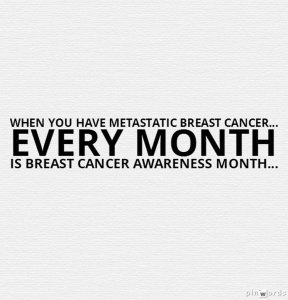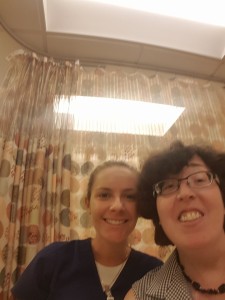HOW LONG HAVE YOU BEEN LIVING WITH MBC? Seven years. I was diagnosed at age 43 in August 2009. I will be 51 at the end of 2016.
DID YOU HAVE A FAMILY HISTORY? Yes. My mom died from inflammatory metastatic breast cancer at age 53. Anyone with a family history should talk to their doctor to determine an appropriate screening schedule.
 WHAT OTHER RISK FACTORS DID YOU HAVE? Well, the biggest one would be being a woman…followed by getting older… I am childless, meaning I have had a longer exposure to estrogen. Also, I am of Ashkenazi Jewish descent. About 10 percent of Ashkenazi Jewish women diagnosed with breast cancer in the U.S. have a BRCA1/2 mutation. I do not have either of these mutations, however.
WHAT OTHER RISK FACTORS DID YOU HAVE? Well, the biggest one would be being a woman…followed by getting older… I am childless, meaning I have had a longer exposure to estrogen. Also, I am of Ashkenazi Jewish descent. About 10 percent of Ashkenazi Jewish women diagnosed with breast cancer in the U.S. have a BRCA1/2 mutation. I do not have either of these mutations, however.
Scientists believe that certain disorders became more common among Ashkenazi Jews because of at least two processes: the founder effect and genetic drift. (Read on for an explanation.)
IS YOUR CANCER HEREDITARY? No. Despite my family history, genetic testing showed I am NOT a carrier of the BRCA1 or BRCA2 mutations. Being diagnosed with cancer prior to age 40 can signify a hereditary connection, but as of 2016, the answer for me is “No.” People should know that for most cancers (breast are otherwise) are not hereditary—only about 10% fall into that category. Most cancer is considered “sporadic” meaning it just happens.
DID YOU HAVE EARLY STAGE BREAST CANCER THAT CAME BACK? No. I was metastatic from first diagnosis, aka a de novo presentation. This puts me in the minority–about 94% of those with Stage IV breast cancer were previously treated for early stage breast cancer. Given my mom’s history, our Ashkenazi Jewish background and other factors (not having children, etc.), I had a medium to high risk for developing breast cancer. I did not expect to be dealing with it in my 40s. We often think of breast cancer as an old lady’s disease–probably because the median age for breast cancer in the US is 61, but younger people (and men) can get it.
WHAT SUBTYPE IS YOUR CANCER? I have the most common subtype: ER/PR positive and HER2 negative. About 80% of people with breast cancer have this subtype. It is sometimes referred to as “estrogen-receptor positive disease” meaning that the cancer uses estrogen to grow. The other two common subtypes are generally referred to as HER2 positive and triple negative. Someone with HER2 positive breast cancer can used a “targeted” therapy; unfortunately with the triple negative subtype there is nothing to target and chemotherapy is generally the only treatment option available.
WHAT TREATMENTS HAVE YOU HAD? People are sometimes surprised to learn that although I have lived with Stage IV breast cancer, I haven’t had IV chemo…yet. Most people are familiar with early-stage breast cancer where you might have surgery, perhaps radiation and then, if needed, a limited course of chemotherapy.
Stage IV breast cancer means treatment for life. Once the cancer cells escape the breast and spreads to a distant organ, there is no way to remove all of it. The Metastatic Breast Cancer Alliance uses a dandelion analogy to explain this. If you can pull a yellow dandelion up, roots and all, you have eliminated that dandelion from your lawn. If the dandelion has gone to seed, it doesn’t matter if you dug up the entire plant—those seeds have escaped. You might not see them sprout right away, but sooner or later you will.

Stage IV breast cancer is a marathon…not a sprint. Where possible, patients start with the least toxic option first. Not all patients will get the same mileage out of a given drug. It might work for months, maybe years (if you are very lucky) or not at all (if you’re unlucky). Eventually drug resistance sets in and a drug stops working. Patients must then go on to their next treatment—eventually most will run out of treatments.
Here are the drugs I have had to date: Tamoxifen (2009 to 2011); Femara (2012 to 2014); Faslodex (Jan 2015 to April 2015); Afinitor/Exemestane (May 2015 to August 2015). November 2015 to present: Xeldoa. The last two drugs are oral chemo drugs. IV chemo is likely next, but hopefully not soon. Because my cancer is estrogren-driven, I had ovarian suppression shots from 2009 to May 2012 and eventually an oophorectomy. I also get a quarterly bone boosting infusion.
Surgery is not standard of care for someone with Stage IV disease but in some cases there is thought to be a benefit. I had a unilateral mastectomy followed by about a month of radiation in 2010.
 HOW OFTEN DO YOU SEE YOUR ONCOLOGIST? I see my oncologist monthly. If I were on IV chemo, I would see him more often. Every three to four months my oncologist sends me for CT/PET and bone scan. These test determine if my treatment is working—these tests make most MBC patients anxious—patients frequently refer to “Scansciety.” If the cancer stayed the same (nothing bigger or smaller) that means I am “stable” and that is a good thing. Having No Evidence of Disease (NED) is even better. Progression is the worst news a patients can get—it means their disease has spread and they must change treatments. Unfortunately, there is no guarantee how long one may remain stable or NED—in the majority of cases, eventually the disease does spread.
HOW OFTEN DO YOU SEE YOUR ONCOLOGIST? I see my oncologist monthly. If I were on IV chemo, I would see him more often. Every three to four months my oncologist sends me for CT/PET and bone scan. These test determine if my treatment is working—these tests make most MBC patients anxious—patients frequently refer to “Scansciety.” If the cancer stayed the same (nothing bigger or smaller) that means I am “stable” and that is a good thing. Having No Evidence of Disease (NED) is even better. Progression is the worst news a patients can get—it means their disease has spread and they must change treatments. Unfortunately, there is no guarantee how long one may remain stable or NED—in the majority of cases, eventually the disease does spread.
ANY LONGEVITY SECRETS? No. I am just “lucky.” I started out with a low-volume of bone-only disease. My disease has had a fairly slow tempo to date. I can’t take credit for those things–I was just fortunate my cancer responded to the drugs. I now have extensive bone mets (again, I am glad to say they haven’t caused me pain). At the end of 2015, I learned I have liver mets. So far, I have been fortunate to remain symptom-free and a good quality of life. I know this will change—so I try to live in the present. I don’t have superior doctors, more powerful drugs or a better attitude than any other patient. I just was fortunate at the cellular level. As oncologist George Sledge says, “Biology is gloriously messy.”
ANYTHING TO ADD? We are all statistics of one. My experience is just that–my experience.
Love you, Catherine! Keep on keeping on!
[…] Katherine shares her stage IV story of being diagnosed with metastatic breast cancer seven years ago. […]
What a story… thanks for sharing!
Just saying that the fact that you are BRCA negative doesn’t mean your cancer is not hereditary – it could also mean they haven’t found all the genes yet. There’s still so much we don’t know…
yes…and that is why I am doing additional genetic testing next month. At this point, it doesn’t matter for me–my treatment would not change. But I would like to know so I can hopefully help my family. That is why I said “As of 2016, my cancer isn’t considered hereditary.” Because that could change as more info becomes available.
I truly wish you well and may God give you strength to continue to deal with this , I am so sorry
You story has been helpful to me to read. Friday I’m having lunch with a customer who is a family practice MD. I am very fond of her and today I learned that she just found out her breast cancer has returned and it is stage 4. She is not interested in pursuing treatments and although I respect her decision I am very saddened.
Excellent writing. I’m so sorry you have this. I fall into the old lady group 🙂 with Mets 4 popping up a month ago after being clean since 2005. I have low bone mets now, and Ibrance and Lerozole are shrinking a lymph node cluster down. Thanks for saying hi on Twitter. I have learned from you and have been encouraged by you.
Excellent writing. I’m so sorry you have this. I fall into the old lady group 🙂 with Mets 4 popping up a month ago after being clean since 2005. I have low bone mets now, and Ibrance and Letrozole are shrinking a lymph node cluster down. Thanks for saying hi on Twitter. I have learned from you and have been encouraged by you. I’m not sure if this comment posted….I’m on my phone…
Thank you for this post. You have described my journey to date. I am just starting Faslodex after endocrine theraply has failed. I had a good ru of 9 years with stage IV. Hopefully the Faslidex will work for me.
Wishing you all the best.
Debra in Seattle
Thank you so much for sharing your story Katherine! I hope you continue to be symptom free. Even though I had breast cancer at 30, and am an Ashkenazic Jew, I was also negative for BRCA1 and 2. I just had bloodwork taken at my last gyno appointment – they are currently arguing with the insurance company about paying for it. My doctor wanted to update my results before the end of this year while it’s at least theoretically covered. I think my first test was in the 1990s as part of a study. Treatment has come a long way since the mid-1980s. The surgeon I went to when pregnant with my son (5 years post-mastectomy) was horrified that I was pregnant and had me in tears at every visit (he made me come frequently). Thank goodness the American Cancer Society’s Bosom Buddies had other women I could talk to who had children after breast cancer. I guess the reason I didn’t realize until after I was laid off is because you weren’t diagnosed until after I was laid off! Keep up your wonderful zest for life! Seeing the joy on your face while on your adventures has been inspiring!
I just hit the 13 1/2 year mark last month, of living with mbc, also denovo. Only family history is one great grandmother who had bc about 100 years ago, and good Victorian Irish Roman Catholic that she was, she was treated with her doctor never seeing her naked breast! We have sure come a long way! I have bone mets only, got almost five years from Femara with Zometa, then switched to Faslodex, which I am still taking. Stopped Zometa when Xgeva approved. Though it doesn’t seem that there is a heredity factor in my getting bc, there may likely be a heredity factor in my doing well. My paternal grandmother and a cousin on that side of family had other cancers and also did exceedingly well….actually, both were cured. I see my onc just every 4 months, have blood work before each appt with her, and we only do scans when I have a symptom that needs tracking down. Our long term plan has been to stick with hormonal treatment.